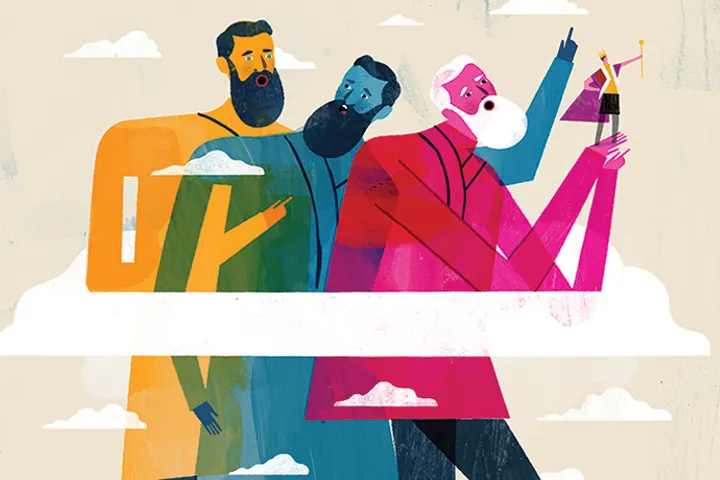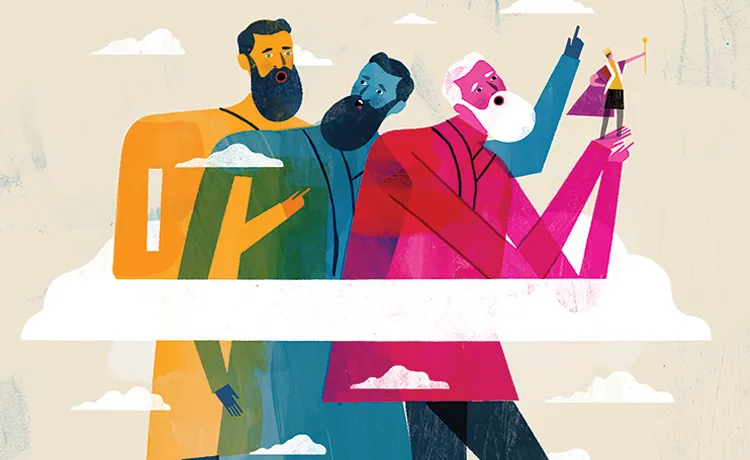Each month we ask two writers to reflect on a quote by Dr. Stanley. For January, Renee Oglesby and Amanda Crosby explore what it means to have a Savior who is fully God and fully man—and how His understanding of the human experience enriches our relationship with Him. Here’s an excerpt from Dr. Stanley’s book Every Day in His Presence:
Jesus knows exactly how you feel—even at this very moment. The struggles you face are not foreign to Him in the least. Actually, they are very personal. Rejection, betrayal, loss, grief, physical pain—He’s experienced them all. And when you face them, He feels compassion for you (Matt. 9:36) … Jesus understands exactly how deep your feelings go and exactly what you need to survive the trials you face.
Take 1
By Renee Oglesby
As someone who grew up in a conservative church and came of age in the 70s, sometimes I feel at odds with myself. This tension even springs up as I read Scripture. Verses like these occasionally give me pause: “For there is one God, and one mediator also between God and mankind”; “For you are all sons of God through faith in Christ Jesus”; and “Therefore, everyone who confesses Me before people, I will also confess him before My Father who is in heaven” (1 Tim. 2:5; Gal. 3:26; Matt. 10:32—all NASB1995, emphasis added).
The emphasized terms, at first glance, just don’t include me.
I know some modern Bible versions incorporate gender neutral or inclusive language to help people like me get past these semantic barriers, small though they may be. I understand the cultural attitudes towards women in biblical times and in the eras in which Bibles were translated. And I fully recognize the truth that “there is neither male nor female; for you are all one in Christ Jesus” (Gal. 3:27-28). I am not a man nor a son; nonetheless, God calls me His child.
However, if we let them, even small barriers can become onerous over time.
“The struggles you face are not foreign to Jesus in the least. Actually, they are very personal.”
Few things are more compelling to a romantic nature than the thought of being understood. So when I read, “Jesus knows exactly how you feel—even at this very moment. The struggles you face are not foreign to Him in the least” it fills my spirit with joy. But there’s still a part of me that thinks about all the indignities peculiar to a woman’s life–and to my singleness and childlessness. The idea that Jesus could understand the feelings of a woman, about being a woman, doesn’t seem possible.
Yet there is no disagreeing with Dr. Stanley’s conclusion later in the devotion, “He suffered just so He could fully comprehend [my] pain.” In the garden of Gethsemane, on the night before His crucifixion, Jesus said, “My soul is very sorrowful, even to death.” He prayed not once, not twice, but three times, “My Father, if it be possible, let this cup pass from me” (Matt. 26:38-39 ESV).
I’ve never faced crucifixion, and I can’t even imagine that level of desperate prayer. But I have called out to my Father with a troubled soul about things I wished He would change. And I’ve prayed for something not once, not twice, but more times than I can count. Haven’t you?
The idea that Jesus could understand the feelings of a woman, about being a woman, doesn’t seem possible.
Yet Jesus ends His heartfelt prayers with the most selfless of pleas: “Not as I will, but as You will” (Matt. 26:39). Sometimes the hardest part of prayer is the laying down of that which you most earnestly desire and expressing to God, “I want only what You have for me, Father. Your will be done.” To know that Jesus prayed that prayer brings me great solace and provides a humbling example to follow.
Lately, when I read “man” and “mankind” and “sons of God” in my New American Standard, I remind myself that I am included and understood—that God’s Word is for me, to me, and about me. My barrier about its language is one I built—one that wasn’t always helped by the culture around me—but I can choose to pull it down. Or rather, I can give thanks that Jesus pulled it down for me.
Take 2
By Amanda Crosby
Have you ever felt completely alone in a crowded room? That’s my least favorite feeling. In the seventh grade, I alienated myself from Abi, the only true friend I’d ever had. I thought I could do better friendship-wise—I wanted to be popular. So, when it came time for lunch, I attempted to sit with different cliques, but none accepted me. For a time, I ate my daily turkey sandwich alone.
Every human being feels this way at some point in his or her life, but what about the Lord? When Dr. Stanley wrote that Jesus has experienced “rejection, betrayal, loss, grief, [and] physical pain,” it made me wonder. But then it dawned on me: He knew exactly what it’s like to be lonely—our Savior experienced the shame and isolation of sin. In fact, He experienced it at a far greater intensity than we will ever comprehend.
When I read accounts of Christ’s crucifixion, I typically focus on the drama—earthquakes, darkness, and the veil tearing—but in that great moment of revelation, Jesus was utterly alone.
When I read the Gospel accounts of Christ’s crucifixion, I typically focus on the drama—earthquakes, darkness, and the veil tearing—but in that great moment of revelation, Jesus was utterly alone. As our ransom, He hung on the cross bloodied and naked, bearing the full weight of every sin that ever happened or ever would. And when He did, God turned His sight away from His Son. In that moment, Jesus felt a level of loneliness and agony far greater than we could ever imagine. This mystery is one we may never fully grasp, but our attempts help us better apprehend God’s boundless, unconditional love and understanding for humanity.
In school, my loneliness came to an end when I turned to God and He provided me a second chance with Abi. I thought I had been alone, but He was beside me all along, understanding every ache that I had. When I suffered in this small way and eventually gave the pain to Him, God was even kinder, as He doubly blessed me with the friends Abi had made in the meantime. She may never have met any of them if God hadn’t transformed my mistake into something wonderful.
A handful of these people, including Abi, are still my close friends today. I learned then that, though we may not ever see it, God will always use our pain and loneliness to further His kingdom. Jesus’ sacrifice created a never-ending relationship with us who accept His gift. So though you may feel alone, you aren’t. The Lord is with you to comfort and guide you, and He knows exactly how you feel.





